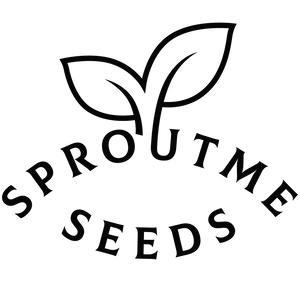Borage
Borage is a versatile herbaceous plant valued for its culinary uses, medicinal properties, and ornamental appeal. It produces beautiful blue flowers that attract pollinators to the garden.
Preparing for Growing:
- Selecting a planting location: Choose a sunny location with well-drained soil.
- Soil preparation: Prepare the soil by loosening it and incorporating organic matter for improved drainage and fertility.
- Purchasing or preparing containers/pots: If growing in containers, select pots with drainage holes to prevent waterlogging.
Starting from Seeds Indoors:
- Seed preparation: Borage seeds do not require special treatment before sowing.
- Choosing suitable pots/containers: Use seed trays or small pots filled with seed-starting mix.
- Sowing and caring for seeds indoors: Sow seeds thinly on the soil surface, cover lightly with soil, and keep the soil consistently moist until germination.
- Transplanting to larger containers if necessary: Transplant seedlings to larger containers once they have developed several sets of true leaves.
Starting from Seeds Outdoors:
- Soil preparation: Prepare a seedbed with well-draining soil and remove any weeds or debris.
- Selecting appropriate timing and method for outdoor sowing: Sow borage seeds directly in the garden after the last frost date in spring.
- Caring for seeds outdoors: Keep the soil consistently moist until seeds germinate, which typically takes 7-14 days.
Growing in Containers/Pots:
- Selecting suitable plants for containers: Choose compact borage varieties suitable for container growth.
- Container and soil preparation: Use containers with good drainage and fill them with well-draining potting mix.
- Sowing or transplanting plants into containers: Sow seeds or transplant seedlings into containers, ensuring they are planted at the same depth as they were in their original containers.
- Caring for container plants: Place containers in a sunny location, water when the top inch of soil feels dry, and fertilize with a balanced fertilizer every 4-6 weeks during the growing season.
Transplanting to Garden:
- Soil and planting site preparation: Choose a location with well-draining soil and full sun.
- Correct timing and method for transplanting: Transplant seedlings outdoors after the last frost date, spacing them 12-24 inches apart.
- Post-transplant care: Water newly transplanted seedlings deeply and provide shade for a few days to help them acclimate to outdoor conditions.
Plant Care:
- Watering: Borage plants have moderate water needs and prefer consistently moist soil. Water deeply when the top inch of soil feels dry.
- Fertilizing: Apply a balanced fertilizer every 4-6 weeks during the growing season to promote healthy growth.
- Weeding: Keep the area around borage plants free of weeds to reduce competition for nutrients and water.
- Pest and disease management: Borage is relatively pest and disease-resistant but may occasionally suffer from issues like aphids or powdery mildew. Monitor plants regularly and treat any problems promptly.
Harvesting:
- Determining when plants are ready for harvest: Harvest borage leaves and flowers as needed once the plants are well-established.
- Harvesting and storage guidelines: Harvest leaves and flowers in the morning when they are at their freshest. Use them immediately or store them in airtight containers in the refrigerator for a few days.
When to Start from Seeds by USDA Plant Hardiness Zones:
- Start borage seeds indoors 4-6 weeks before the last frost date in your area or sow them outdoors after the danger of frost has passed.
Fast Facts:
- Planting depth: Sow seeds 1/4 inch deep.
- Seed spacing: Thin seedlings to 12-24 inches apart.
- Plant spacing: Space plants 12-24 inches apart.
- Number of seeds per pot/container: Sow several seeds per container and thin to the strongest seedling.
- Water preferences: Borage prefers consistently moist soil.
- Sun preferences: Full sun to partial shade.
- Soil type and other important factors: Well-draining soil with a pH of 6.0 to 7.0.
- Companion Planting: Plant borage near tomatoes, squash, or strawberries to improve growth and repel pests.
- Temperature Preference: Borage prefers moderate temperatures and is tolerant of light frost.
- Days to Germination: Borage seeds typically germinate in 7-14 days.
- Days to Harvest: Harvest borage leaves and flowers as needed once the plants are well-established.







